Thousands of Palestinians fled to southern Gaza in search of refuge Friday after Israel warned them to evacuate before an expected ground offensive.
Nearly 1,800 Gazans -- again most of them civilians and including over 580 children -- have been killed in waves of missile strikes on the densely populated enclave, the health ministry said.
Hamas took an estimated 150 Israeli, foreign and dual national hostages back to Gaza during its initial attack, according to Israel.They said on Friday that 13 of them had been killed in Israeli air strikes. It has previously said four hostages died in bombardments.
UN Secretary-General Antonio Guterres appealed for Israel to "avert a humanitarian catastrophe" after its calls to evacuate north Gaza, his spokesman Stephane Dujarric said.
Israeli ground forces made "localised" raids into Gaza in the last 24 hours.
Tensions meanwhile rose across the Middle East and beyond, with angry protests in support of the Palestinians, while Israel faced the threat of a separate confrontation with Hezbollah in Lebanon.
A Reuters video journalist was killed in south Lebanon, the international news agency said. Several other journalists were injured, including two from Al-Jazeera, the broadcaster said.
Israeli forces said earlier troops were "responding with artillery fire towards Lebanese territory" after a blast damaged the border barrier.
In the occupied West Bank, at least nine Palestinians were killed by Israeli fire during protests supporting Gaza, taking the toll there to 44 since Saturday, the health ministry said.
Palestinian Prime Minister Mohammed Shtayyeh accused Israel of committing "genocide" in Gaza.
In Gaza, UN officials said the Israeli military, whose troops are massing at the border, had told them the evacuation should be carried out "within the next 24 hours".
It later admitted it would take more time, however, and did not confirm it had set the deadline.
But the United Nations described the immediate movement of some 1.1 million people -- nearly half of the 2.4 million in the Gaza Strip -- as "impossible".
It urgently appealed for the order to be rescinded. Aid agencies have warned mass evacuations would stretch support to the limit, as fuel, food and water dwindled due to an Israeli blockade.
Hospitals are struggling to cope with the dead and wounded from the relentless bombardment, and the health system was already "at a breaking point", the World Health Organization said.
Ashraf al-Qudra, from the Gaza health ministry, said hospitals were "starting to lose capacity" and medicine was running out.
In Jordan, after a meeting with US Secretary of State Antony Blinken, King Abdullah II called for "humanitarian corridors" to be opened urgently.
Egypt, which runs the Rafah crossing to the south of Gaza, faces a dilemma of accepting refugees with the possibility that Israel may never let them return, weakening Palestinian aspirations for statehood.
"Where to go?" asked Umm Hossam, 29, who was among the thousands fleeing.
"How long will the strikes and death last? We have no homes left, every area of Gaza is under threat," she added, her face streaked with tears.
AFP correspondents in Gaza said the Israeli military on Friday dropped flyers warning residents to flee "immediately" south of Wadi Gaza, with a map pointing south across a line in the centre of the 40 kilometre-long (25 mile-long) territory.
AFP correspondents said there were "heavy strikes" in the northern Gaza Strip on Friday morning, including Al-Shati refugee camp and Gaza City, primarily targeting residential buildings.
The Hamas media office also reported Israeli air raids on Khan Yunis and Rafah in the south.
In Geneva, the International Committee of the Red Cross said the attacks on Israel could equally not justify "the limitless destruction of Gaza".
Thousands of Gazans were on the move in search of safety, carrying plastic bags of belongings, suitcases on their shoulders and children in their arms.
Some walked while others drove, with belongings strapped high to the roofs of their trucks, cars and carts pulled by donkeys.
More than 423,000 people have already fled their homes, according to the UN, which said the evacuation order could turn what is "already a tragedy into a calamitous situation".
Gaza has been under a land, air and sea blockade since 2006 and Israel has vowed not to turn back on water, food and power supplies until all hostages are freed.
Norway's Foreign Minister Anniken Huitfeldt condemned the siege while Arab League chief Ahmed Abul Gheit said Israel's evacuation order is a "forced transfer" that constitutes "a crime".
Palestinian president Mahmud Abbas said it will be "tantamount to a second Nakba" or "catastrophe", referring to the 760,000 Palestinians who fled or were expelled from their homes during the 1948 war that accompanied Israel's creation.
Israel has called up 300,000 reservists while forces, tanks and heavy weapons have been moved to the southern desert area around Gaza, an AFP correspondent reported.
In fields along the border, artillery fires like clockwork with a deafening noise every 30 seconds towards barely visible targets in Gaza, shaking the earth.
Israel faces a potential second front in the north after the Iran-backed Hezbollah group in Lebanon said it was "fully prepared" to join Hamas in the war when the time was right.
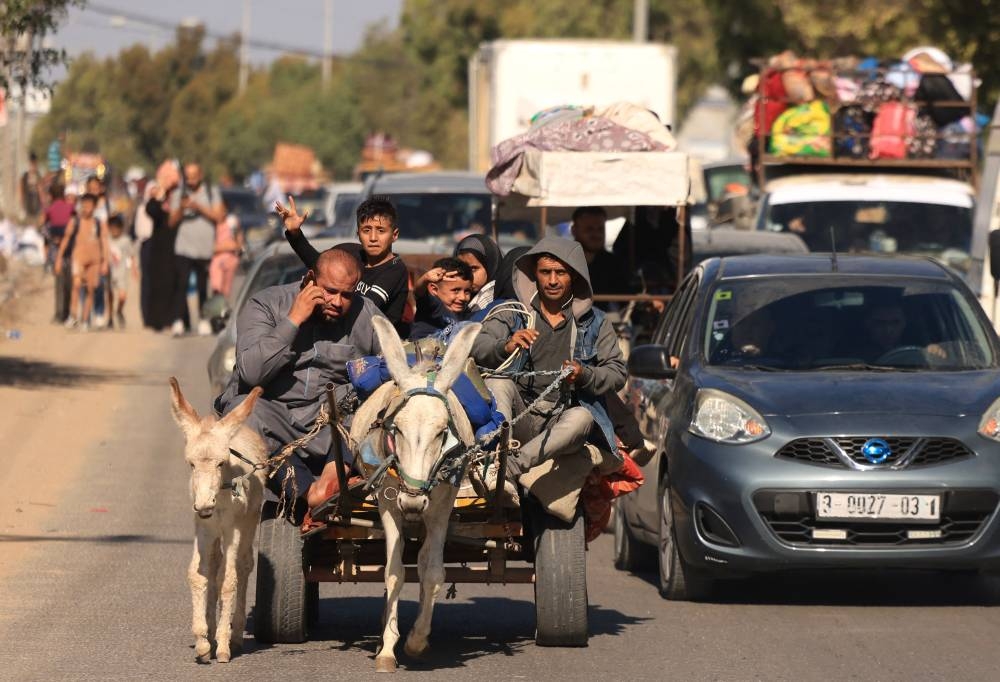
Riding a donkey drawn cart as family along with hundreds of other Palestinian carrying their belongings flee following the Israeli army's warning to leave their homes and move south before an expected ground offensive, in Gaza City Friday. AFP
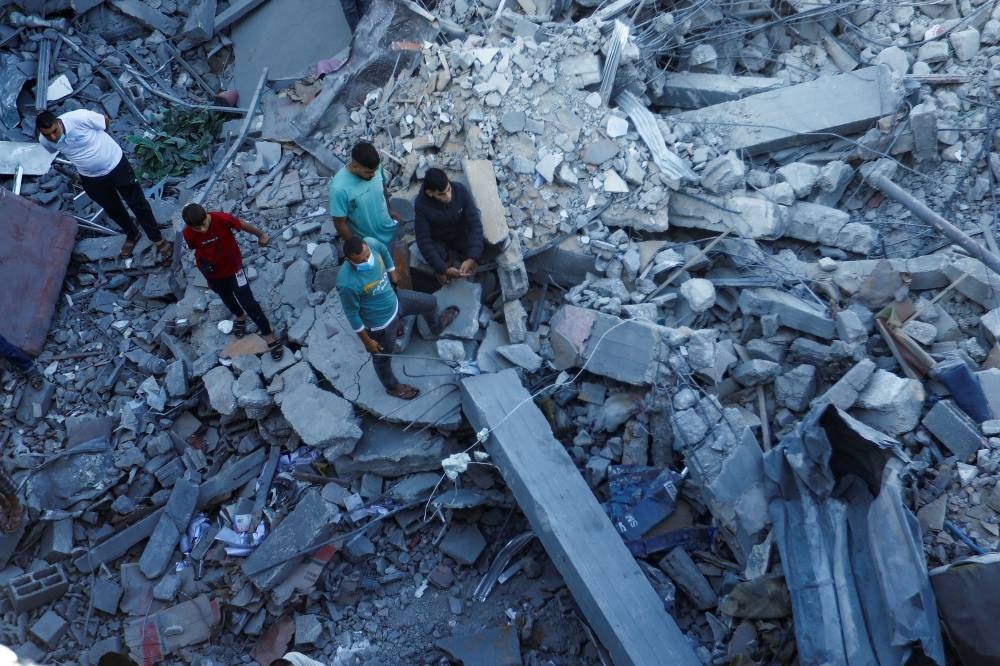
Palestinians search for casualties under the rubble in the aftermath of Israeli strikes amid the ongoing conflict between Israel and the Palestinian Islamist group Hamas, in Khan Younis in the southern Gaza Strip Friday. REUTERS
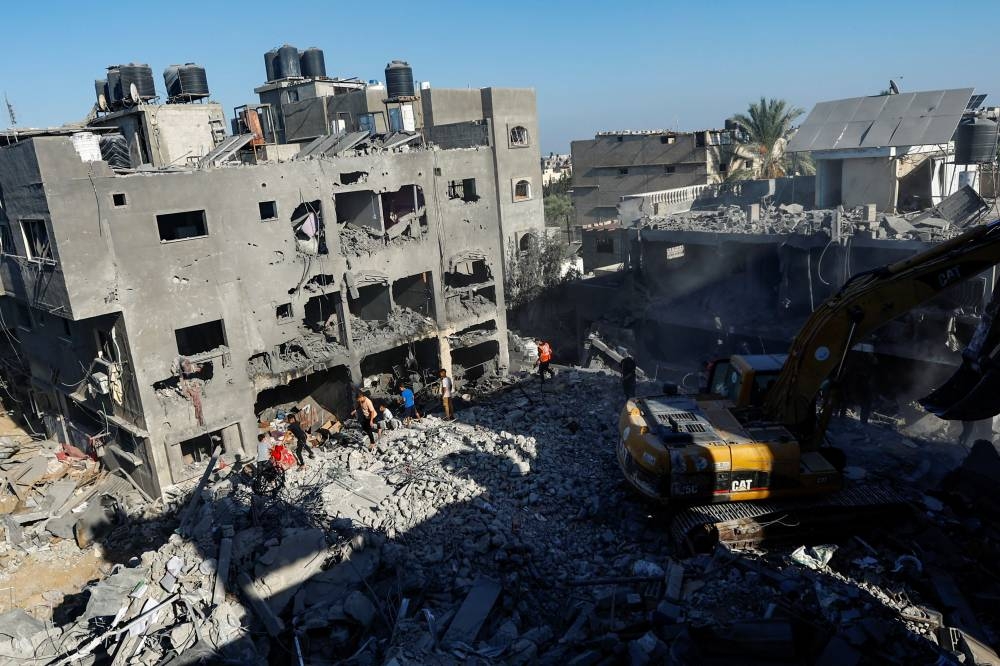
Palestinians search for casualties under the rubble in the aftermath of Israeli strikes amid the ongoing conflict between Israel and the Palestinian Islamist group Hamas, in Khan Younis in the southern Gaza Strip Friday. REUTERS/Ibraheem Abu Mustafa
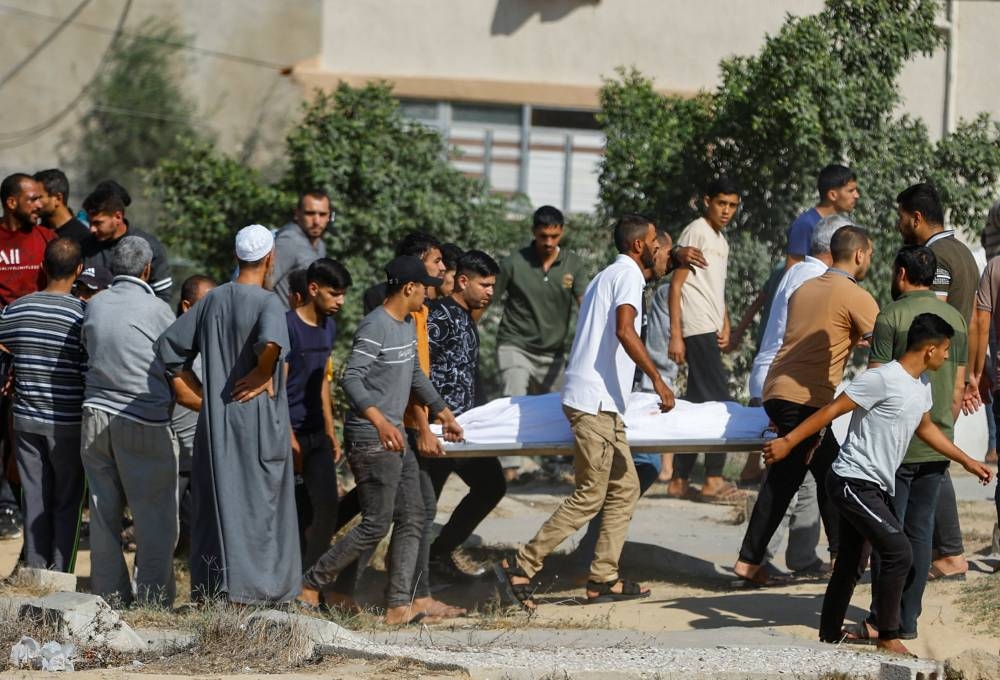
People carry the body of a Palestinian killed in Israeli strikes amid ongoing conflict between Israel and the Palestinian Islamist group Hamas, in Khan Younis in the southern Gaza Strip Friday. REUTERS
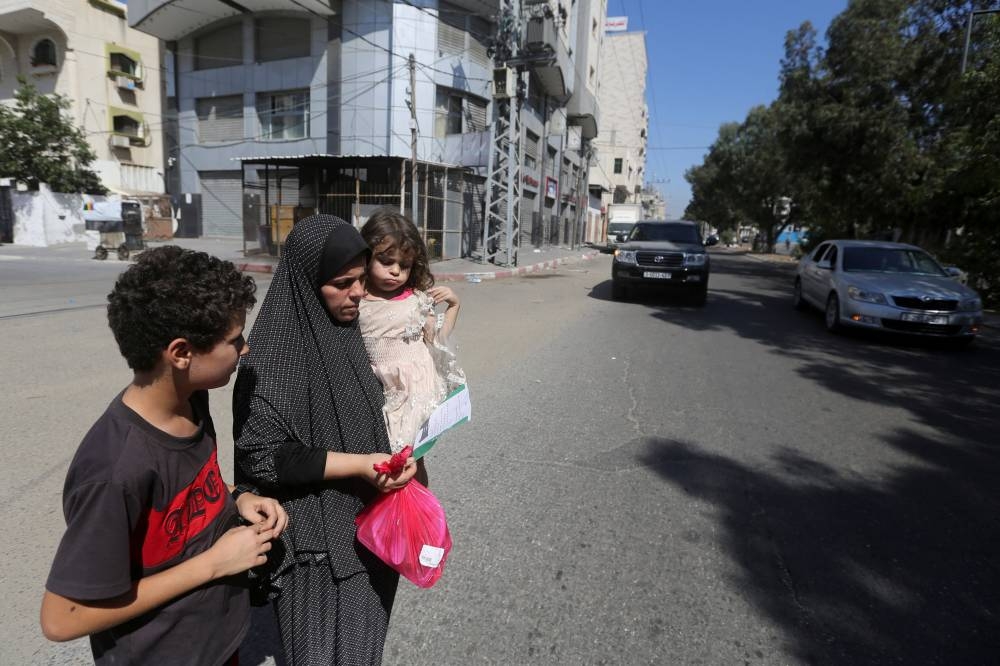
Palestinians flee their houses heading toward the southern part of Gaza Strip after Israel's call for more than 1 million civilians in northern Gaza to move south within 24 hours, amid the Israeli-Palestinian conflict in Gaza City Friday. REUTERS
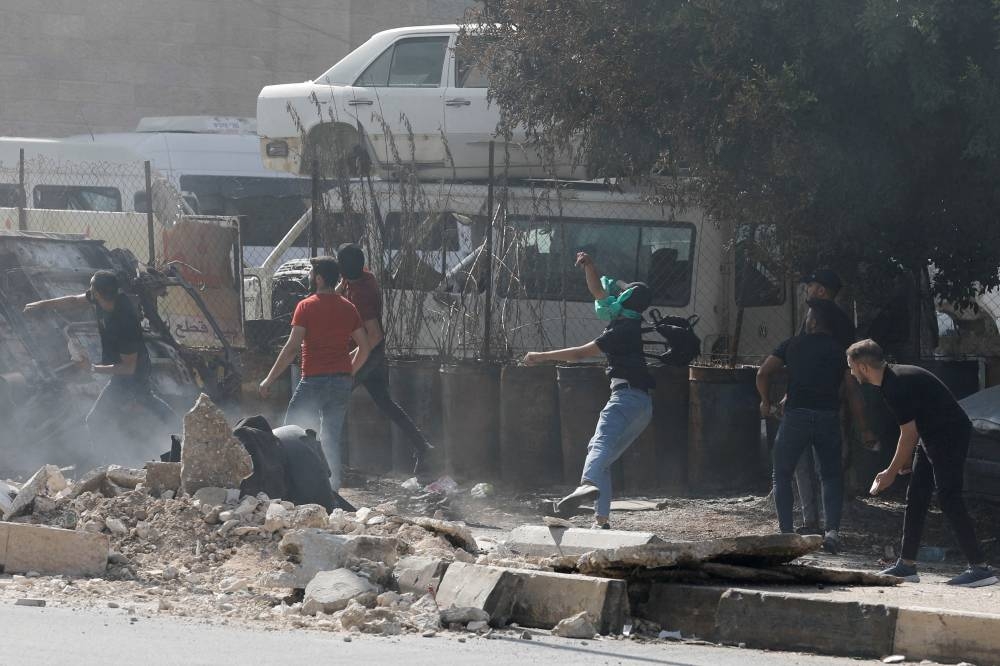
People throw objects as Palestinians take part in a protest following Israeli strikes on Gaza, in Nablus, in the Israeli-occupied West Bank, Friday. REUTERS
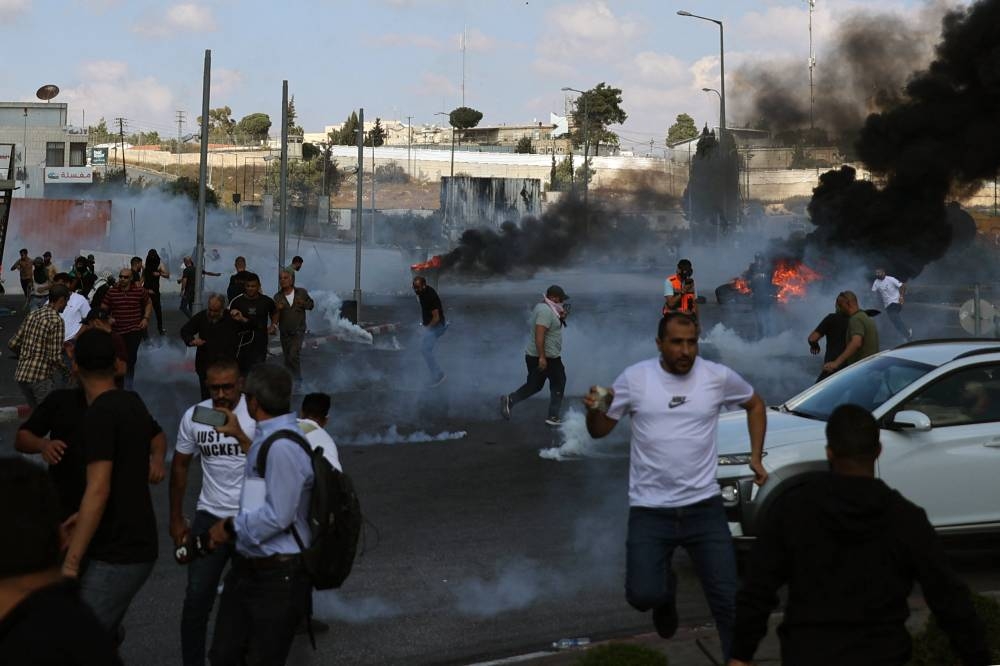
Palestinians scatter during clashes with Israeli soldiers at the north entarnce of the Palestinian city of Ramallah, near Beit El Jewish settlement, in the occupied West Bank on Friday. AFP
